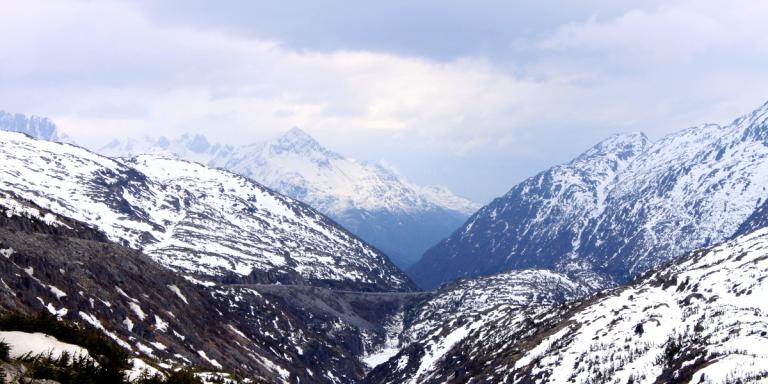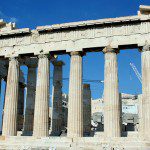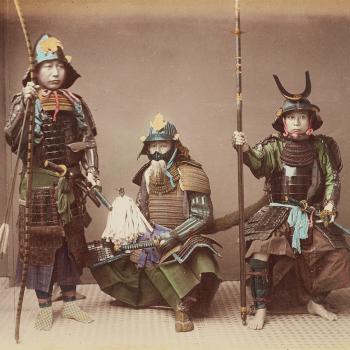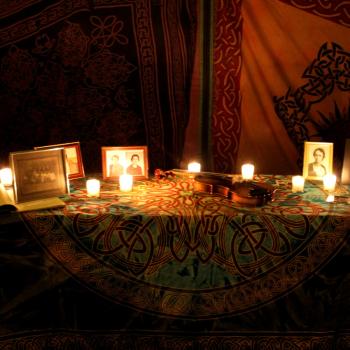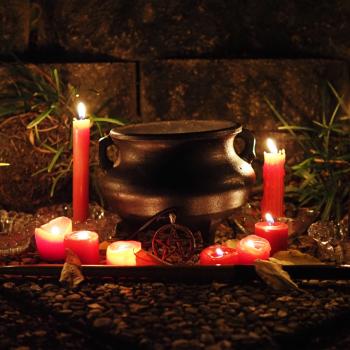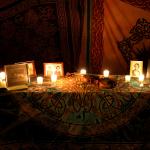I’m a religion geek. I love discussing religious history and lore, beliefs and practices, theology and doctrine, experience and interpretation. Doesn’t matter which religion – I’ll eagerly talk about any and all. Mind you, I said talk about, not argue about. Religious debate is sometimes necessary, but it’s not fun like religious conversation.
Get a handful of polytheists together and sooner or later the conversation comes around to “so, what are They up to?” The Gods have agency and They use it. We see and feel Their work in our lives. We hear similar stories from others – and in the words of Isaac Bonewits, “coincidence is seldom mere.” Something is going on and we curious humans can’t help but wonder what it is – unquestioning faith is not a Pagan virtue.
What follows is neither authoritative divine revelation nor the consensus of learned priests and scholars. It’s not even UPG – unverified personal gnosis. This is simply the speculation of one polytheist who talks to other polytheists and likes to think about what he hears.
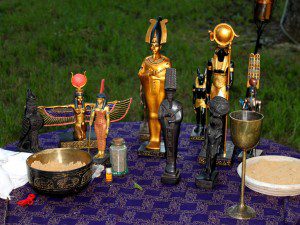 Many Gods, Many Plans. Any talk of “the Gods” in the collective sense is guaranteed to be general and vague. In many cases the language is a carryover from our monotheist overculture. The Gods are individuals and like individual humans, cats, and rivers, They each have Their own goals, desires, and areas of interest.
Many Gods, Many Plans. Any talk of “the Gods” in the collective sense is guaranteed to be general and vague. In many cases the language is a carryover from our monotheist overculture. The Gods are individuals and like individual humans, cats, and rivers, They each have Their own goals, desires, and areas of interest.
A simple reading of Their stories shows that various deities are at odds with each other. Gods may change over time, but I see nothing to suggest that, for example, Horus and Set are now working together – quite the contrary. Different pantheons have even more differences in traditions, values, and priorities.
The Gods may share certain divine attributes, but both ancient evidence and contemporary experiences show They do not share every goal and plan and They do not all work collectively. We can speak of Morrigan’s plans or Zeus’ plans or Brighid’s plans, but “the Gods’ plans” is not a useful phrase.
The Perspective of the Gods. Time changes one’s perspective. If the Gods are not immortal They’re close enough by human standards. It is reasonable to assume that whatever grand plans They may have are concerned with the long-term promotion of their virtues and values. What we want right now – and quite possibly, even what They want right now – is subordinate to Their longer term goals.
Many ancient Gods were said to live on mountaintops. This is in part because mountaintops are in our world but still very difficult to access. But it’s also because mountaintops give a “big picture” perspective of what’s going on at ordinary elevations – we can see the whole forest, not just the individual trees.
The nature of the Gods gives Them a longer, broader perspective than our own. If we can’t understand what They’re doing, our different perspectives is a likely reason why.
The Immediacy of the Gods. I’m not sure immediacy is the right word here, but I can’t think of another word that describes what it’s like when a mighty being focuses Their attention and efforts on one situation, one person, one thing. The Gods may have the perspective of the ages, but when They do something, They do it NOW. I like to think of this as single-mindedness, but perhaps what we observe is simply the portion of the Gods our human minds can comprehend.
If we can’t see where They’re headed, perhaps it’s because what we do see is so focused on the task at hand it leaves few clues as to what the next task will be.
Beware of Assuming They Want What You Want. Do I need to bring up the Westboro Baptist Church, whose god conveniently hates everyone they do? One of the things that consistently comes up in conversations with other polytheists is that what we hear from Them is usually challenging. They challenge our assumptions, They challenge our comfort zones, at times They challenge our sanity. While They can be reassuring and at times even comforting (depending on the situation), the more closely what you hear aligns with your wants the more likely it is you’re listening to your own ego.
OK, But What ARE They Up To? The only completely honest answer is “I don’t know” – for the reasons outlined above. But as I watch and listen and contemplate, three things stand out to me.
1. Many of the Gods are Gods of Nature. We can debate all the ways “personification of natural forces” can be interpreted, but to me, the important thing is that They are closely connected to the natural world.
2. The natural world is being desecrated by human activity. Climate change. Overpopulation. Extinctions. Ecosystem destructions. The history of the Earth includes many cataclysmic events, but for the first time they are being caused by creatures with conscious awareness of what we’re doing. But we are not exempt from Nature’s laws – when we exceed the carrying capacity of our environment (in consumption if not in raw numbers), we will crash.
3. Some of the most currently active deities are associated with battle and its aftermath. I’ve heard followers of both Morrigan and Odin talk about how They appear to be working together, or at least sharing resources towards the same goals.
What is coming will not be easy, but the history of humanity is a history of dark times interspersed with short periods of brilliance. Our ancestors got through times worse than what we face now and will face in the coming years – we will get through this.
What are the Gods up to? I don’t know. But I do know They are our oldest, strongest, and wisest allies. I know that honoring Them and supporting Their values and virtues is a meaningful and helpful way to live. I know that through Them I am part of something bigger and more important than myself.
And those are good enough reasons to keep practicing, even if I can’t help wondering what They’re up to.


